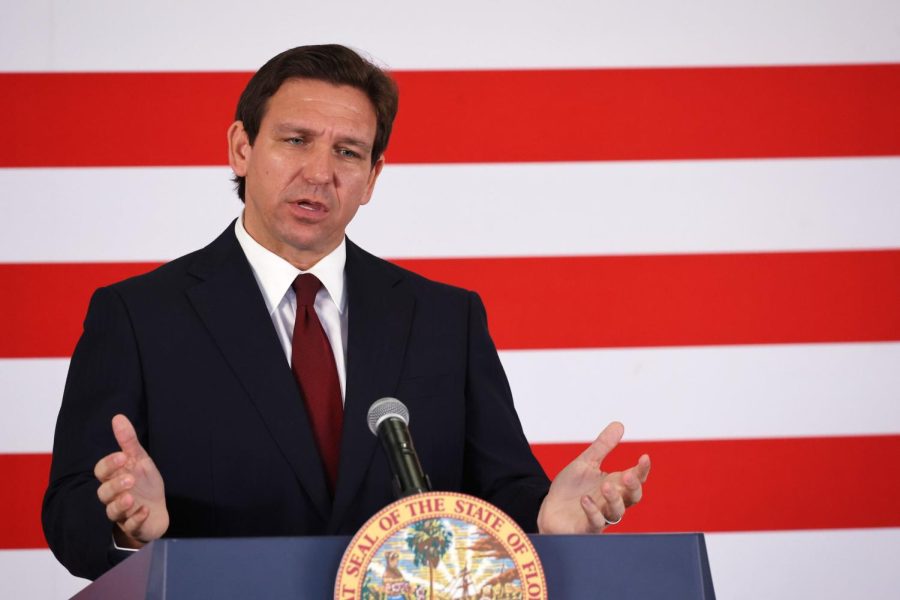Opinion: Why we need critical race theory in school
Florida Gov. Ron DeSantis holds a news conference to sign the Reedy Creek bill, on Monday, Feb. 27, 2023. (Ricardo Ramirez Buxeda/Orlando Sentinel/TNS)
Mar 8, 2023
To start off, this is my experience of what it’s like to be a first-generation Mexican American. I grew up hearing many stories from people in my culture, sharing the struggle and hardships I can’t imagine living through.
The same goes for every minority that is disenfranchised: Black communities, Indigenous communities, Asian communities, LGBTQ+ and nonbinary communities, people with disabilities, immigrants and women living in America.
I can only speak for myself, but I owe everything to those communities because of their sacrifices, hardships and movements. They’re responsible for the opportunities and the freedom many of us have now, especially me.
As a Porterville native raised in the Valley, every act of discrimination, oppression and violence was normalized and no one taught me why it was happening.
People assume discrimination against Mexicans was introduced during Donald Trump’s presidency.
A former U.S. president called people of my ethnicity “rapists.” America caged migrant children, and the American Academy of Pediatrics said its overall treatment of those kids “meets the criteria for torture.” None of this was talked about in my schools. I grew up trying to process everything that happened during that time.
My mom worked in the fields and then worked countless hours in different types of jobs. She worked hard to gain citizenship and learn English without a high school diploma. She did not understand or have the time to learn critical race theory and teach it to me.
Unlike me, she did not have time to learn and teach me that America used to trick Hispanics and Latinos into sterilizations. Or that it illegally deported Mexicans who were American citizens, with former president Harry S. Truman blaming immigrants for low wages, and calling this program “Operation Wetback.”
I learned this on my own time. It’s frustrating and infuriating to learn this and deal with the regular hardships of growing up, too. But to me, that’s not what made it saddening.
Once I understood the systemic issues in America, especially racism, I went through a back-and-forth wave of anger and anxiety for many years. This is because I continue to learn more about America’s destruction of my people and the people of every other minority community.
For me, it’s frustrating, not just because it happened (although it’s a big reason), but because it’s never acknowledged. I have to now process it all later in my life.
I wondered why I was never taught about this in public school. Then on Jan. 31 I read that Florida Gov. Ron DeSantis wants to block state colleges from teaching diversity, equity and inclusion programs and critical race theory.
If we ever want to grow as a nation, the U.S. needs to implement teachings like critical race theory in our schools immediately. Those opposed to it must understand its true definition before dismissing the idea as a whole. Kimberlé Williams Crenshaw, a law professor at UCLA, coined the term and defined it below.
“It is a way of seeing, attending to, accounting for, tracing and analyzing the ways that race is produced,” Crenshaw said in a New York Times article. “The ways that racial inequality is facilitated, and the ways that our history has created these inequalities that now can be almost effortlessly reproduced unless we attend to the existence of these inequalities.”
American culture (capitalist culture) tricks people into believing that we are on an even playing field. This is called “oppression blindness,” according to an article written by Abby L. Ferber and Dena R. Samuels, professors at the University of Colorado.
They said this occurs because individuals are hesitant to acknowledge their privilege.
“It is no wonder that individuals, especially those who are most privileged, often resist acknowledging the reality of ongoing inequality. We are immersed in a culture where the ideology of oppression blindness is pervasive,” they wrote in the article.
Acknowledging privilege is a crucial first step in critical race theory, but this is where many people struggle the most.
In an article written by Gina Crosley-Corcoran, an author and activist, she said as a white person herself, she was hesitant to acknowledge her privilege because she grew up in a poor financial situation. But she understood that finances don’t change privilege and that the idea of intersectionality accepts multiple kinds of privilege and oppression.
“The concept of intersectionality recognizes that people can be privileged in some ways and definitely not privileged in others. There are many different types of privilege, not just skin color privilege, that impact how people can move through the world or are discriminated against,” Crosley-Corcoran wrote in the article.
“I know now that I am privileged in many ways. I am privileged as a natural-born white citizen. I am privileged as a cisgendered woman. I am privileged as an able-bodied person. I am privileged that my first language is also our [most commonly used] language,” she added.
On the other hand, some people, such as DeSantis, incorrectly alter this concept, saying teaching about American oppression is oppressive.
“We believe an important component of freedom in the state of Florida is the freedom from having oppressive ideologies opposed upon you without your consent,” DeSantis said at a news conference.
DeSantis fails to recognize that education about racism, sexism and all other kinds of oppression doesn’t blame an individual, but the system as a whole. According to Crosley-Corcoran, everyone in America has some privilege, including myself and readers.
Some Americans want to think that if they’re not racist, then they’re not the problem. But the problem is not caused by an individual, but the discourse we all practice regarding race, gender and oppression.
DeSantis and many opponents of critical race theory fear it will oppress certain children by making them feel guilty. This is a false parallelism. They are falsely equating the experiences of those kids who are privileged to the experiences of kids who are oppressed, ignoring their oppression entirely.
Now, school systems must be careful even using the phrase “critical race theory.”
The Fresno Unified School District approved adding ethnic studies, but it still needs to make a “fine line” that it’s not critical race theory, as reported by the Fresno Bee. Fresno Unified defined the class as the “critical and interdisciplinary study of race,” but it’s not critical race theory? Got it.
Although it is mandatory for California high schools to implement ethnic studies, I commend Fresno Unified. It would’ve been great to have this before I graduated in 2019.
It’s the sentiment that America continues to ignore systemic oppression. It makes sense to me how people can be oppressed and how we contribute to those systems, but it’s disheartening to learn about and deal with it alone.







